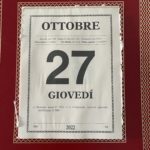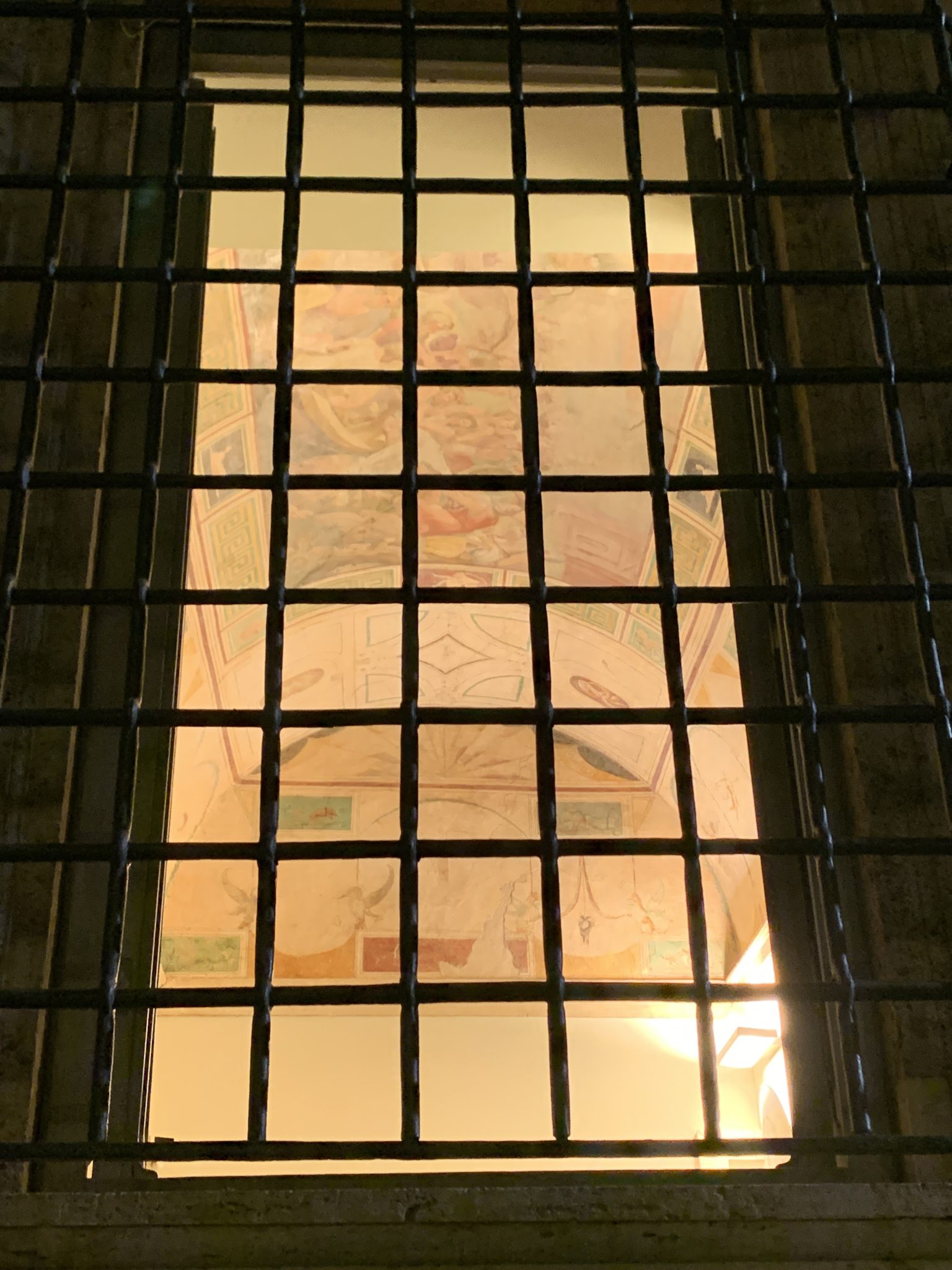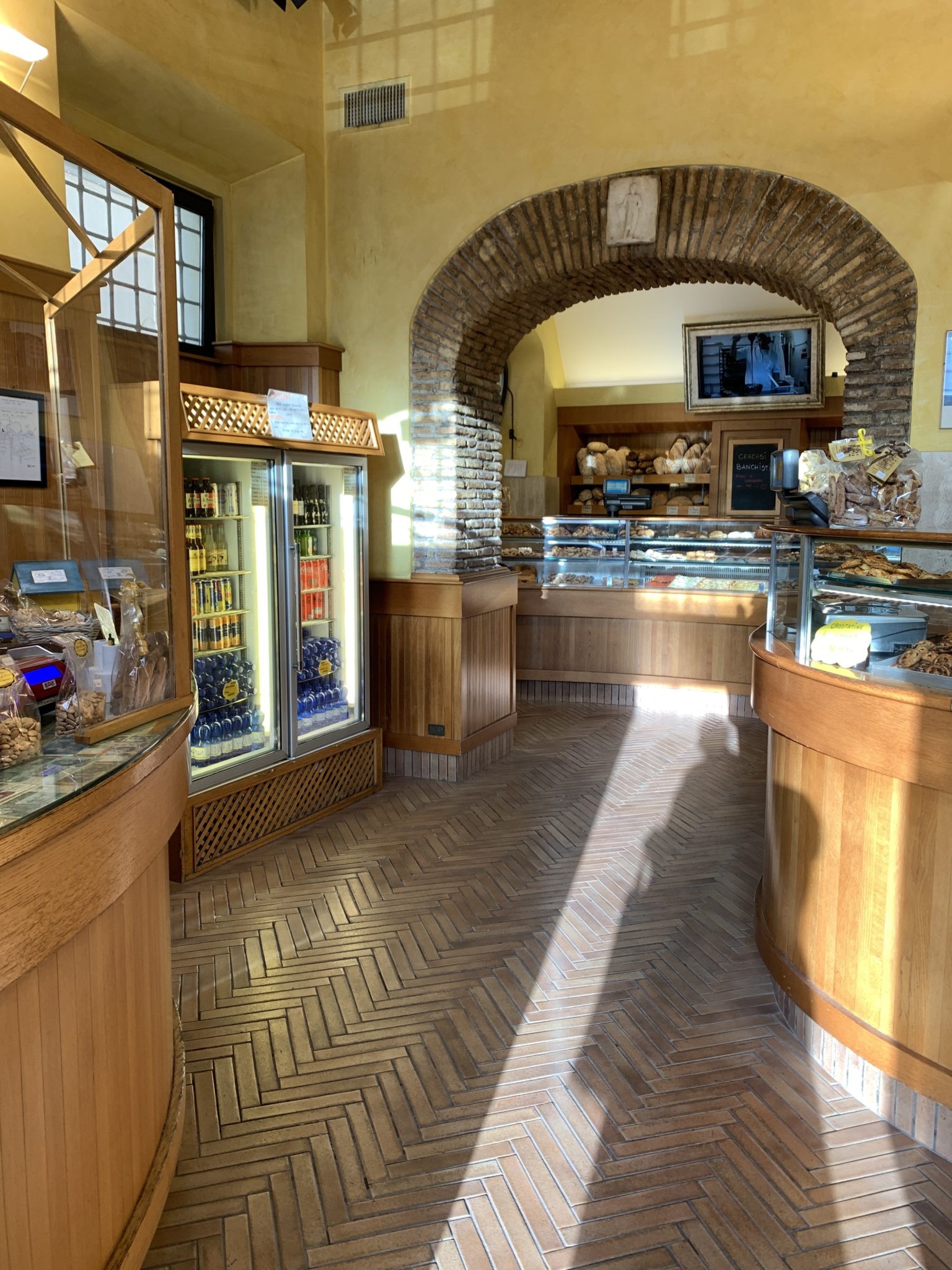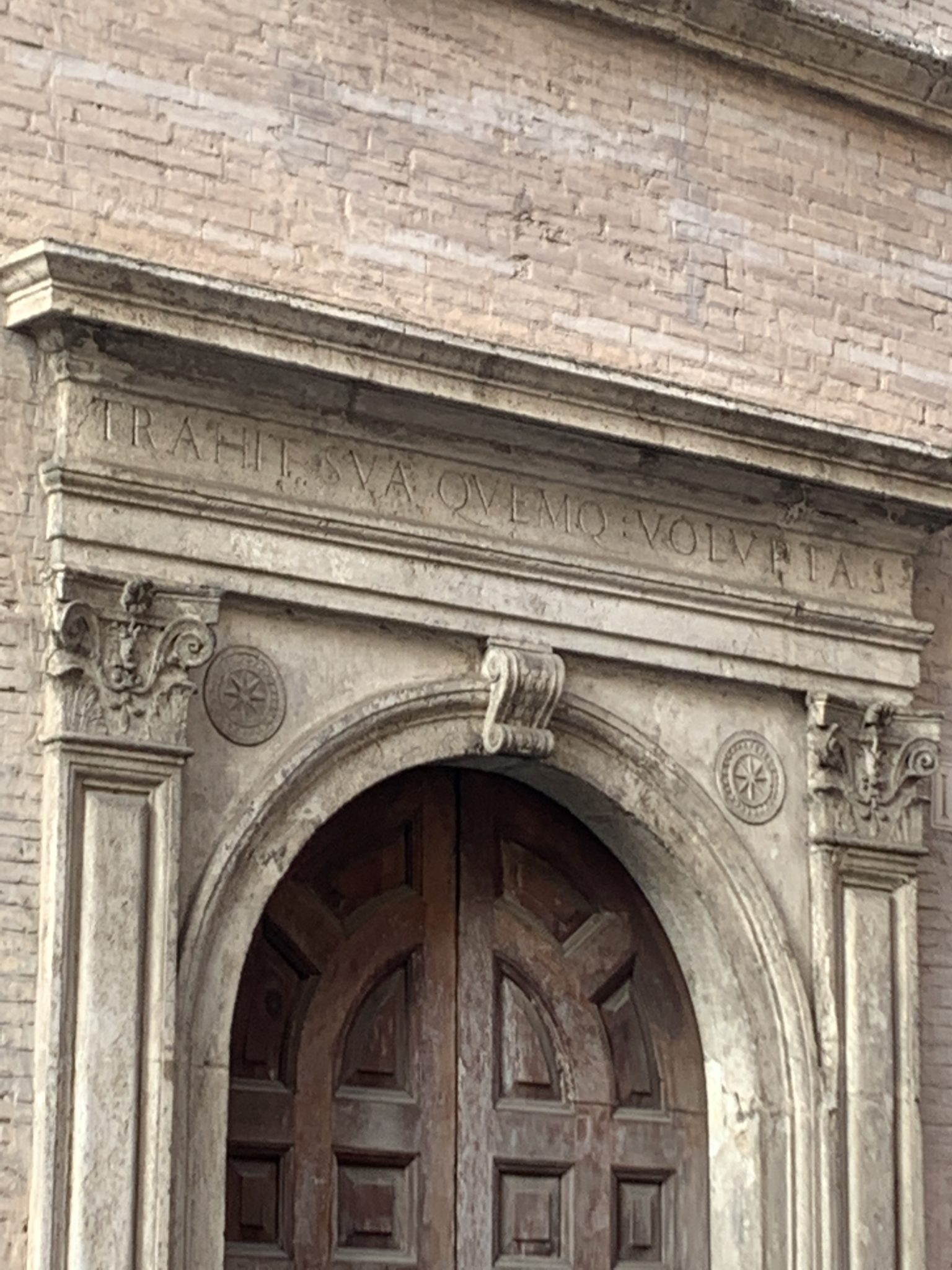 Roman sunrise 7:34. Roman sunset 18:13. Ave Maria: 18:30. The Moon is new. There are 66 days to go in this calendar year. It is the Feast of St. Frumentius consecrated bishop by St. Athanasius and preached the Gospel in India where he was martyred.
Roman sunrise 7:34. Roman sunset 18:13. Ave Maria: 18:30. The Moon is new. There are 66 days to go in this calendar year. It is the Feast of St. Frumentius consecrated bishop by St. Athanasius and preached the Gospel in India where he was martyred.
It is also, if you are following the older old ways, the Vigil of St. Simon and Jude, celebrated in Roman purple.

The Introit of the Vigil had me thinking about canceled priests all during Mass and the increasingly frequent phenomenon of bishops who see priests not as brothers and collaborators but rather as potential problems and pawns to move about. Perhaps this manifests in the accelerating shift of many prelates in the Church to a new religion wherein the entire past is to be reinterpreted, memory-holed, and then fire-walled away.
The Introit in question:
(Ps. 78/79:11) Intret in conspectu tuo, Dómine, gémitus compeditórum: redde vicínis nostris séptuplum in sinu eórum: víndica sánguinem Sanctórum tuórum, qui effúsus est. (Ps. 78/79:1) Deus, venérunt gentes in hereditátem tuam: polluérunt templum sanctum tuum: posuérunt Jerúsalem in pomórum custodiam [LXX oporophulakiov – ].
(Ps. 78/79:11) Let the groans of the prisoners enter into your gaze, O Lord: bequeath to our neighbors sevenfold in their innermost self: repay our neighbors sevenfold into their bosoms; avenge the blood of Your holy ones, which hath been shed. (Ps. 78/79:1) O God, the heathens have come into Your inheritance, they have defiled Your holy temple: they have made Jerusalem as a guard of fruit (they have laid waste to Jerusalem). Glory be… Let the groans…
ὀπωροφυλάκιον – oporōphulákion – pomorum custodia – hard to unravel this, in the LXX the Greek is a strange word that means something like “a temporary guard’s shack for overseeing some crops”. What is left of such a thing when an invading army comes through and takes your crops by force? A ruined, smoldering shack. What’s left after the crops are gathered and the field lies fallow? A shack falling apart. This is what Jerusalem is likened to in the LXX version. The Hebrew ‘î is straight forward: ruin. The Latin came from the LXX.
The smoke of Satan is rising from the burning of the “guards” of the “fruits” that the Church has lovingly and lavishly cultivated in her sacred cult, her liturgical worship. While those who desire our traditional worship are driven to the periphery of the Church’s life and even beyond, we see an acceleration of proposals about sins that cry to Heaven and empty “walking together” towards an undefinable vanishing point.
On my “walking alone” this morning, I spotted this in a nearby palazzo.

The Antico Forno at the Campo de’ Fiori. This morning I was the only customer, which I have never experienced there before. I had to have a photo to prove it to myself. NB: cassock shadow and bag with my purchase of pizza bianca for a lunch sandwich and some casareccio.

For those of you who like the food posts, this was from yesterday. It’s enough for two, but hope springs eternal. It was basically some things I needed to use, a pepper, fennel, some red onion and sausages I had pulled from the icebox.

Along the road, this. TRAHIT SUA QUEMQUE VOLUPTAS. Virgil, Eclogues II. 65.

Speaking of pleasures, BLACK to move, win material and improve. Material is equal, but not for long. This isn’t too complicated.

Priestly chess players, drop me a line. HERE
NB: I may hold comments with puzzle solutions a little longer than others so there won’t be “spoilers” for others.
If you are looking to learn or to improve your game – and who isn’t? – try this guy. HERE
I found this amusing. Magnus v. Hikaru. Magnus has already locked up the tournament but there is still a game to be played and these two have some weird chess fun with the “Bongcloud” opening. It is called the “Bongcloud” because you would have to be completely stoned to think that it was a good idea. Here we have first time ever in a tournamet: the Double Bongcloud.
Holy Mass today was for a particular Roman Sojourn Donor, DM, whose “direct message” was well received. I am so grateful to all of you who regularly send support and who donate also ad hoc or by sending items from my wishlist. It is both my pleasure and duty to pray for you and remember you at the altar. Another way you can give me a hand is to use my links for my affiliate programs, that way we both benefit. Please remember me when shopping online at Amazon. Thanks in advance. – US HERE – UK HERE

To send a donation, monthly (please!) or one-off try Continue To Give: use your phone’s camera to activate the Q code or text 4827563 to 715-803-4772 (US) for a link.
For Zelle and Chase, etc., use frz AT wdtprs DOT com.
I had a long conversation with a priest friend this morning about the state of things. We agreed. Now, more than ever, we have to stay resolute and stick together in the face of what is yet to come.


































1. …f4
2. Bh3 g5
The white bishop is lost.
NB: I may hold comments with puzzle solutions a little longer than others so there won’t be “spoilers”.
Fr. Z
Thank you for the Chess updates! My 15 year old son Thomas is playing Chess here in Chile on line with his oldest brother who is stationed in the USAF in England. It is really interesting to watch and a great connection with family.
Also I really appreciate the food and cooking photos and shots. Just awesome.
I wanted to ask you if you have ever cooked over or on a big ole fashion wood stove?
It is a different type of cooking. The whole stove is a cooking implement. Instead of using eyes for heat the whole top has varying degrees of hot. Closer to the fire the hotter you get. Not to mention the oven which is really OLD SCHOOL and needs a special skill as well. It really becomes important to monitor your fire and use dry wood as well as other things that i now take for granted.
Just curious if you have ever tried cooking on a wood stove? If so how did it go? Send photos please !
“It is the Feast of St. Frumentius consecrated bishop by St. Athanasius and preached the Gospel in India where he was martyred.”
I think some wires got crossed on this one. St. Frumentius was indeed consecrated by St. Athanasius. But he was sent to Axum, modern day Ethiopia. “Farther India, which name the ancients gave to Ethiopia,” as Butler has it. From what I’ve read, he wasn’t martyred. I’m sure Constantius would have liked to killed him, but the Emperor of Axum seem to be interested in what he had to say. The Ethiopians have never been interested in Arianism. Among them he was known as “Kesate Birhan,” Revealer of Light, and “Abba Salama,” Father of Peace. Pseudo-orientalists, such as myself, may notice the Semitic similarities: Ge’ez is very closely related to Arabic. St. Frumentius was a great scholar, and was responsible for the first translation of the New Testament into Ge’ez, and he himself was involved in changing the script from being solely consonantal into always marking the vowels.
Jim Dorchak says: cooking on a wood stove?
Yes, but many many years ago, long before digital cameras and the like. It is a challenge. You have to get to know your particular stove and I didn’t have time.
There is an interesting documentary made I think in part by America’s Test Kitchen about the recreation of a 19th c. multicourse meal that required finding the right kind of stove and recovering long lost techniques which people knew back in the day and didn’t have to be described in the cookbooks. It was worked up from the original, highly influential Fanny Farmer Cookbook.
Fr Z
The key to good wood stove heat is dry fire wood of different sizes.
If it is GREEN it just simmers if you even get it started.
Small wood burns hot and fast.
Larger wood burns a little cooler and slower.
Also for best results the stove has to be clean. I mean clean inside so that the heat and smoke can circulate and find its way out the stove depending on what position you have the damper (I.E. to go directly out the chimney or around the oven and then out. It becomes a delicate dance to bake bread if you have never done it before. Too much green wood and smoke and your oven never gets hot.
I know it sounds like a pain but now I would never go back to electric or gas. It just seems to make all the meals you cook tastier. Also a real advantage is that you can be a little messy on the stove top and it makes no difference. No need to clean it up just push it into the fire and call it a day. No scrubbing and using cleanser. Just oil it like you do a good cast iron pan.
Well maybe one day you can give it a go. Thanks for the digression.
Dear Fr. Z,
I really enjoyed the shadow in the doorway picture. When your life story makes it to the big screen, I hope something like that gets used for your character intro. ;-)
Have a great day, Father!
I would play
1…f4
2.Bh4 g5
“????????????? – opor?phulákion – pomorum custodia”
I’ve spent the free moments of my day pondering this one. The same word occurs at Isaiah 1:8:
“And the daughter of Sion shall be left as a covert in a vineyard, and as a lodge (opor?phulákion) in a garden of cucumbers, and as a city that is laid waste.”
The Hebrew presents the word “mlunah” according to the Koehler-Baumgartner “Lexicon in Veteris Testamenti Libros” is a “structure upon which the field-watchman keeps lookout during the night” So it seems to me the LXX translators were working with an alternative text and rendering a Hebrew idiom. The same word occurs in Isaiah 24:20, translating the same aforementioned Hebrew word, but this time indicated the transitive nature of this “temporary shelter.” Both references in the book of Micah, however, have the same word on the Hebrew as our current passage from the Psalm. But the Hebrew ‘i can be rendered as “a heap of stones,” and so it’s not as far off from mlunah as would first appear.
As to the idiom, contemporary scholars appear to have fielded various views, but I think Jerusalem being reduced to a guard shack in a cucumber field is a pretty vivid picture of desolation. Now, Aristotle mentions in the “Problemata” (938a) the job of a ?????????? (oporo-phylax), a guy hired to guard the fields, which I think is the origin of this idiom. It’s clear from the text that they occupy their time keeping animals away from the produce.
For the Psalms, I have always cherished the Commentary of St. Bruno. You can’t pray them all day every day an not pick up on what’s going on:
“…in similitudinem custodiae pomorum, scilicet in similitudinem cujuslibet vili simi tugurii siti in pomeris, in quo solent manere custodes, qui poma custodiunt antequam colligantur; quibus collectis, turgium illud deseritur.”
Those peppers and onions in the skillet look divine.
The silhouette is precious indeed.
May God Bless you Fr Z. and happy belated Birthday greetings – blessed Rome saunterings.